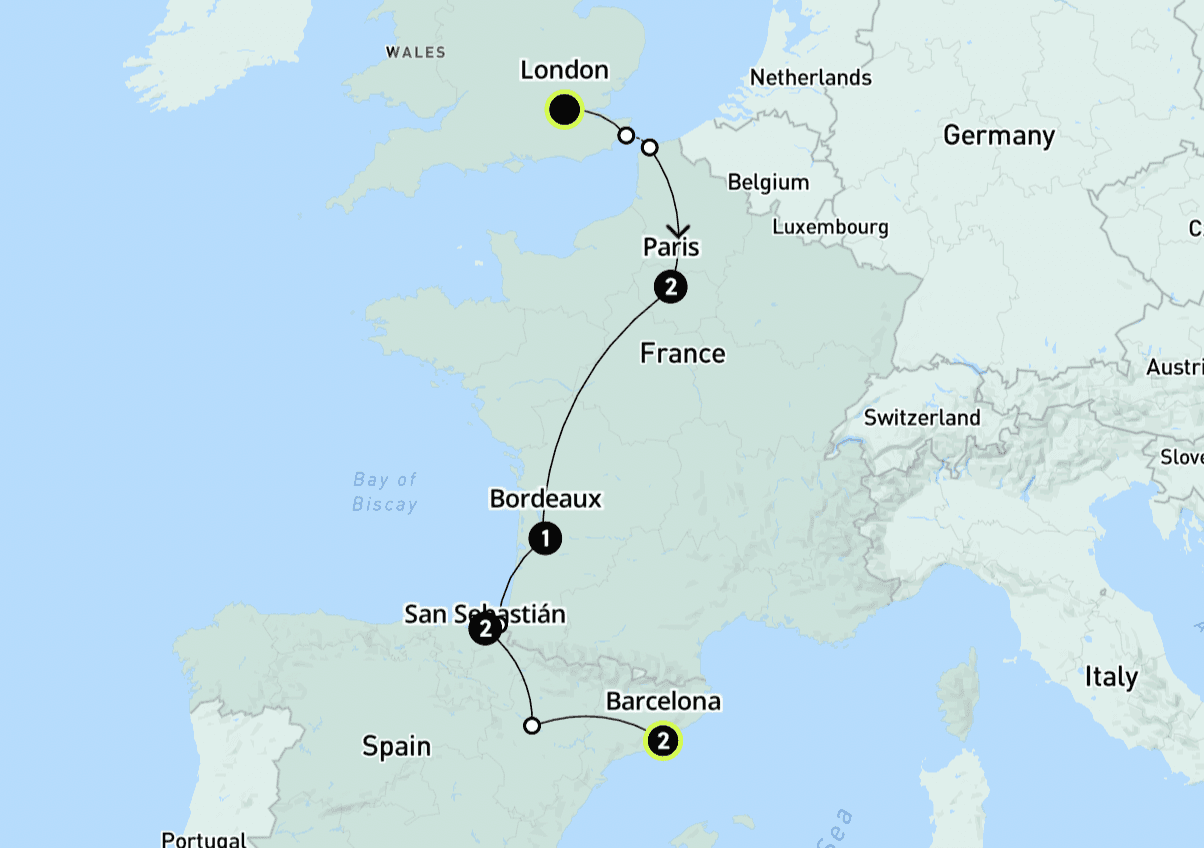Let's cut through the noise: Spain is implementing regulations to address overtourism—not shutting its doors to visitors. After welcoming a record-breaking 85 million international tourists last year, some popular destinations are simply bursting at the seams.

Picture this: narrow medieval streets packed shoulder-to-shoulder with tourists, locals getting priced out of their neighborhoods as apartments transform into vacation rentals, and once-pristine beaches littered with trash. Not exactly the authentic Spanish experience anyone wants, right?
I experienced this firsthand last summer in Barcelona's Gothic Quarter. What should have been a magical evening stroll felt more like navigating a human traffic jam. A local café owner I chatted with (over the most amazing cortado I've ever had) explained how his rent had tripled in five years because tourism had driven up property values so much.
These new measures are Spain's attempt to balance tourism's economic benefits with preserving local communities and environments. It's about quality over quantity—creating a more sustainable experience for both visitors and residents.
Misleading Headlines vs. Reality
"Spain BANS Tourists!" "Tourist Crackdown in Spain!" "Is Your Spanish Vacation Canceled?"
These headlines make for great clicks, but terrible information. Let me share some examples of how the reality differs from what you might have read:
Headline: "Barcelona Bans All Tourist Accommodations" Reality: Barcelona is phasing out some short-term rental licenses by 2028, but hotels and legally registered accommodations remain open.
Headline: "Mallorca Closes Beaches to Tourists" Reality: Certain beach areas now have capacity limits during peak hours, and some are prioritizing resident access during specific times—but tourists can still enjoy the beaches.
Headline: "Spain Implements Tourist Ban to Combat Overcrowding" Reality: Spain is introducing targeted measures like tourist taxes and behavior regulations in specific hotspots—not a country-wide ban.
Spain's Secretary of State for Tourism even issued a statement clarifying: "Spain continues to welcome visitors from around the world. Our goal is to ensure tourism remains sustainable and beneficial for all."
Spain's New Tourist Rules Explained
Tourist Tax Increases
If you've visited Spain recently, you might already be familiar with tourist taxes. These aren't new, but they are increasing in some regions. Here's the current breakdown:
In the Balearic Islands (Mallorca, Ibiza, Menorca), the sustainable tourism tax now ranges from €1 to €4 per person per night, depending on your accommodation type. During high season (May to October), these rates double. A family of four staying a week in a 4-star hotel in Mallorca? That's about €112 extra on your bill.
Barcelona has recently increased its tourist tax too. On top of the Catalonia regional tax (€3.50 for luxury hotels), the city now adds its own €4 surcharge. That's €7.50 per person per night in top hotels!
Valencia and Seville are considering introducing similar taxes soon.
Pro tip: Most accommodations add these taxes at check-out rather than during booking, so budget accordingly. And remember, children under 16 are usually exempt.
Banned Beach Items & Behavior
Spain's beaches are getting a cleanup—literally and figuratively. Several new rules aim to preserve these natural treasures:
• No more smoking on certain beaches in Barcelona, Mallorca, and parts of Andalusia. Getting caught could cost you up to €2,000 in fines!
• Portable speakers are now banned on beaches in Barcelona and parts of Costa del Sol. Want music? Use headphones.
• Single-use plastics (bottles, utensils, food containers) are increasingly restricted on beaches nationwide.
• Beach "reserving" with towels and umbrellas is being cracked down on in places like Benidorm, where staff now remove unattended items.
• BBQs and campfires are prohibited on most beaches.
Last summer, I witnessed lifeguards in Sitges collecting abandoned towels and belongings that people had left to "reserve" spots while they went to lunch. The pile was enormous! These rules might seem strict, but they're designed to ensure everyone gets fair access to these natural treasures.
Walking Tour Caps
Ever tried to enjoy a historic site while surrounded by massive tour groups? Not fun, right?
Barcelona has introduced some of the strictest measures here, limiting walking tour groups to 20 people in the city center and just 15 in the super-crowded Gothic Quarter and La Boqueria market. Tour guides must now use wireless audio systems instead of shouting, and certain narrow streets are off-limits to large groups entirely.
Madrid and Seville have introduced similar caps, although their limits are slightly higher (25-30 people).
When I joined a small-group walking tour in Barcelona last year, our guide mentioned these rules had actually improved her experience too—smaller groups meant better connections with travelers and less strain on her voice. Win-win!
Alcohol Restrictions
The days of unlimited booze at all-inclusive resorts in certain areas are over. In 2020, the Balearic Islands introduced a controversial "three drinks per meal" rule at all-inclusive properties in Magaluf (Mallorca), Playa de Palma (Mallorca), and San Antonio (Ibiza).
The rule limits guests to six alcoholic drinks per day—three at lunch and three at dinner. Want more? You'll have to pay extra.
Additionally, "party boats," booze cruises, and pub crawls face new restrictions in these areas. Happy hours, two-for-one drink specials, and alcohol vending machines are banned outright.
Drinking in public spaces (like beaches and streets) is also increasingly restricted in tourist hotspots, with fines ranging from €500 to €1,500.
These measures target what officials call "excess tourism"—basically, the kind of behavior that gives tourists a bad name.
"Residents-Only" Zones
Some of the most controversial measures involve prioritizing local access to popular areas. In Mallorca, stretches of Playa de Palma now have designated "resident priority" zones during peak hours. This doesn't mean tourists are banned, but locals get preferential access.
Similarly, Barcelona's Park Güell limits daily visitors and offers special access times for local residents.
In Canary Islands' Tenerife, some beaches like Benijo and Roque Bermejo have implemented visitor caps during peak times, with residents getting priority access.
I experienced this system at Park Güell last year, and honestly? It worked beautifully. The park was still filled with visitors, but it wasn't the overwhelming crush I remembered from previous trips. I could actually appreciate Gaudí's mosaic work without being jostled by selfie sticks!
Currency & Payment Rules
Spain has introduced new rules about cash transactions for tourists that you should definitely know about:
• Cash payments from tourists are limited to €1,000 (for Spanish residents, it's €2,500).
• For larger purchases, you'll need to use a credit card or bank transfer.
• When exchanging currency over €1,000, you'll need to show your passport and potentially provide information about the source of funds.
• Some tourist establishments now require card payments only.
These measures aim to combat money laundering and tax evasion, but they affect how you should plan to pay for things on your trip. I always recommend carrying both cash and cards in Spain—some small tapas bars still prefer cash, while many modern establishments are increasingly cashless.
How These Changes Affect Travelers
Short-Term vs. Long-Term Impact
In the immediate future, these changes mean travelers need to do a bit more homework before their Spanish adventures. You'll need to:
• Budget for tourist taxes (they're still relatively modest but add up for longer stays).
• Pack beach-friendly items (reusable water bottles, bluetooth headphones instead of speakers).
• Consider visiting during shoulder seasons (April-May or September-October) when restrictions are often looser and crowds thinner.
• Book accommodations and popular attractions further in advance as capacity limits create more competition for spots.
Long-term, we're likely to see a gradual shift in Spain's tourism model. Prices may continue to rise as the country focuses on attracting visitors who stay longer and spend more. Mass tourism hotspots might become less congested, but also potentially less affordable.
The silver lining? These changes could lead to more authentic experiences as overtourism decreases and local cultures are preserved. My recent trip to Valencia felt markedly different from Barcelona—more relaxed, more local, and honestly more enjoyable despite (or perhaps because of) fewer "must-see" attractions.
Alternatives to Crowded Hotspots
One of the best responses to these changes is exploring Spain beyond the usual suspects. Some of my favorite alternatives to crowded destinations include:
Instead of Barcelona, try Valencia: Equally stunning architecture, amazing food (it's the birthplace of paella!), and beautiful beaches with a fraction of the crowds.
Instead of Costa del Sol, explore Costa de la Luz: This Atlantic coast region offers stunning beaches, charming towns like Tarifa and Conil de la Frontera, and far fewer international tourists.
Instead of Mallorca, consider Menorca: Same beautiful Balearic waters but with a more laid-back vibe and less development.
Instead of Madrid, visit Salamanca: Golden-hued architecture, a vibrant university atmosphere, and some of Spain's best tapas bars.
Instead of overcrowded Andalusian cities, discover Extremadura: Home to incredible medieval towns like Cáceres and Trujillo, without the tourist buses.
Last year, I swapped my usual Mallorcan holiday for a week in Asturias in northern Spain. The green landscapes, empty beaches, and incredible seafood made me wonder why I hadn't explored this region sooner!
Key Takeaways for Travelers
After diving deep into Spain's tourism changes, here's what you really need to know:
Spain still wants tourists—just not all in the same places at the same time. These measures aim to spread visitors across more regions and seasons, creating better experiences for everyone.
Research before you go. Each region has its own set of rules, so check the specific regulations for your destination. The Spanish Tourism Board website offers up-to-date information in multiple languages.
Budget for the extras. Tourist taxes, while not bank-breaking, should be factored into your travel budget—especially for family trips or longer stays.
Consider timing. Visiting during shoulder seasons (May-June or September-October) means fewer restrictions, smaller crowds, and often more pleasant weather anyway.
Embrace local culture. The heart of these measures is preserving authentic Spanish experiences. Try learning a few Spanish phrases, eat where the locals eat, and venture beyond the tourist zones.
Explore underrated gems. Some of my most magical Spanish memories come from places I'd never heard of before visiting—the fishing villages of Galicia, the mountain towns of Asturias, the hidden beaches of Almería.
Remember why we travel in the first place: to experience different cultures, create memories, and connect with places and people. These new measures, while requiring some adjustment, ultimately aim to preserve what makes Spain special.
Spain's approach reflects a broader conversation happening in popular destinations worldwide about what sustainable tourism should look like. By adapting to these changes with an open mind, we can all contribute to preserving these incredible places for future travelers.
Have you experienced any of these new tourism measures in Spain? Are you planning a trip and have questions about how these changes might affect you? Drop a comment below—I'd love to hear your thoughts and help with any concerns you might have!
And if you found this breakdown helpful, please share it with fellow travelers. The more we all understand about responsible tourism, the better our collective travel experiences will be. ¡Hasta luego!
FAQS Travel to Paradiso
Recent Posts



























